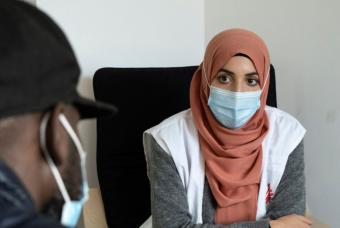
Breadcrumb
- Home
- Mental Health: The Invisible Emergency
Mental Health: The Invisible Emergency
Physical health is important. But now, more than ever, there is a recognition of how mental healthcare and psychosocial support are crucial for overall health.
All over the world, many people are reporting feelings of anxiety due to the COVID-19 pandemic. Some people are fearful of catching the virus. Others might be worried about getting medicine or oxygen for family members who are infected. Aside from fears over the virus, many people are scared and anxious about other things related to the pandemic, from losing their jobs or freedom of movement, to loneliness over being unable to see family or friends for so long.
In one way or another, the pandemic has touched everyone, and it has been difficult.
In our projects around the world, Doctors Without Borders / Médecins Sans Frontières (MSF) has seen the different ways that the pandemic has affected people, and we are doing our best to provide support.
In India, Doctors Without Borders is reaching out to COVID-19 patients over the phone, to help them manage their anxiety and their worries while they’re isolating. In Lebanon, our numerous patients who seek psychological help suffer from depression, anxiety or despair. In Bangladesh, our teams provide mental healthcare, including individual mental health consultations for survivors of sexual and gender-based violence, to Rohingya refugees in Cox’s Bazar. These challenges are exacerbated by the difficult situations in which people find themselves during the pandemic, whether they are refugees in Kenya or domestic workers in Hong Kong.
Long before the pandemic began, Doctors Without Borders has been responding to the mental health needs of our patients in all sorts of emergencies. In the nearly 90 countries where we operate, our teams provide comprehensive mental health support to patients. We provide mental healthcare as psychological first aid in an emergency setting, as part of care for pre-existing conditions, or as standalone psychosocial and psychiatric care.
In different kinds of emergencies, the mental health needs are as important and as urgent as medical needs. Our projects range from conflict to natural disasters, from sexual health to tuberculosis, from refugee crises to search and rescue, where our patients require holistic medical services.
- Why is mental health important?
Mental health conditions—which include depression, anxiety, substance use disorders (including alcohol) and psychoses—can be highly disabling, affecting people’s functionality and capacity to live fulfilling lives. These conditions are also associated with increased mortality: World Health Organization (WHO) figures report that worldwide, 800,000 people die from suicide every year.
People with mental health disorders are also likely to experience comorbidities, which make people sicker and increase their risk of death. According to the WHO, the average life expectancy of people with severe mental health disorders is 10 to 25 years less than the general population.
In the places where Doctors Without Border work, we see patients who have lived through violence or natural disasters, whose survival goes beyond ensuring physical wellbeing. Even after their physical injuries have been treated, hidden psychological wounds can remain. This is why the provision of holistic medical care, which includes mental healthcare, is essential in many of our projects.
- What are the challenges in improving mental health?
People with mental health conditions represent one of the most marginalised and vulnerable groups worldwide. Despite effective treatments for mental health conditions, only a minority of mental health patients worldwide have access to mental health services and even when they do, they often don’t receive the most effective or evidence-based treatments.
Many people do not understand what mental health is, or that there is treatment available to help them. Mental illness remains heavily stigmatised in most places, and where there is a lack of awareness this can contribute to beliefs that people with mental health conditions are evil, or to be feared. The consequences for people with mental health conditions, whose families or communities don’t know how to care for them, can be tragic: around the world, hundreds of thousands of people with mental illness are still being chained or locked up against their will.
Many countries have limited capacity to provide mental healthcare––whether this is due to a lack of appropriate infrastructure, resources or trained professionals. People who face marginalisation, violence, displacement, natural and man-made disasters and other crises may develop mental health problems (or find that existing conditions worsen), and typically face further barriers to getting care for these due to factors such as the disruption of health and social structures and networks, poverty, and distance from healthcare.
What is mental health?
Mental health is a state of well-being in which a person is able to cope with the regular stresses of work and home life, and is able to make a contribution within their community (World Health Organization).
Being mentally healthy is about more than just the absence of specific mental health conditions. Mental health is based on biological, psychological and contextual factors––being healthy in the way we think, feel, and relate to others and our environment.


